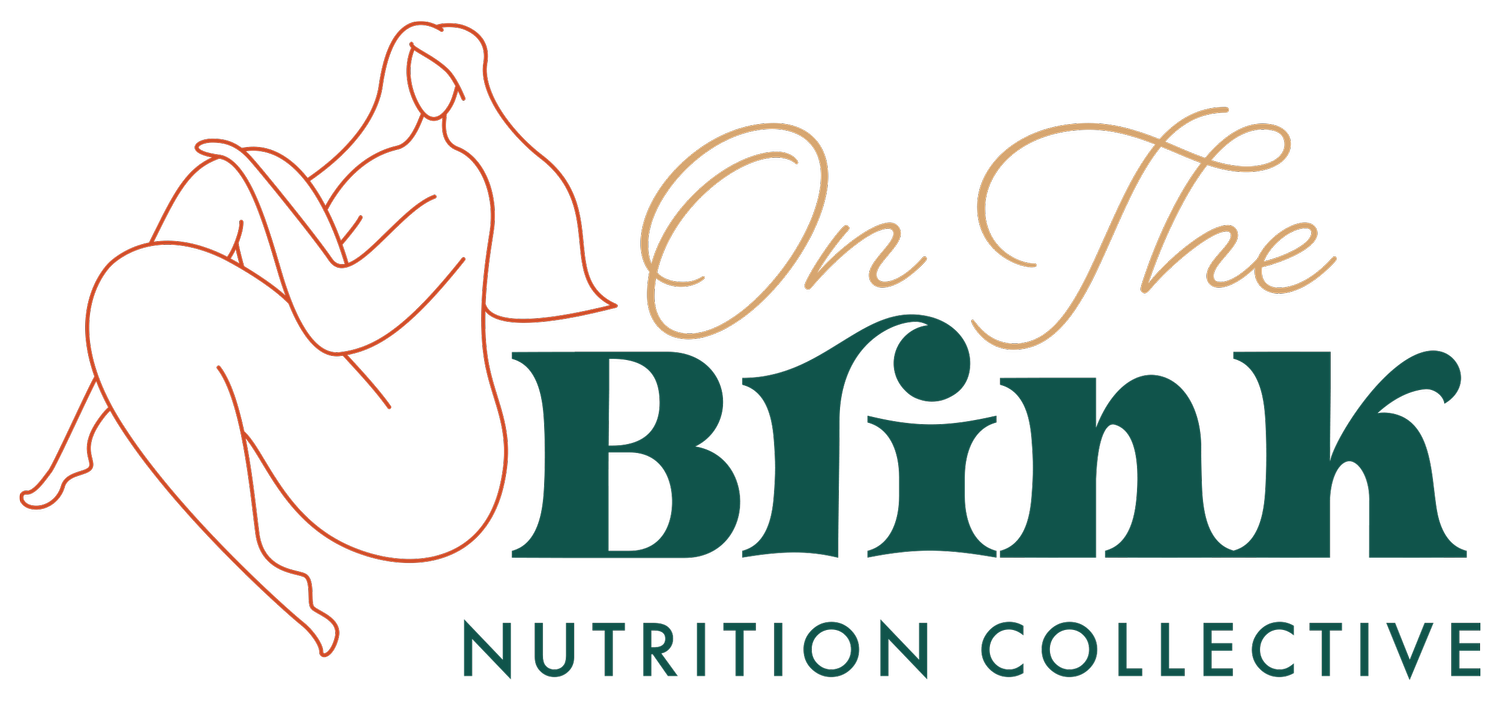Cutting Through the Noise: Recognizing and Avoiding Diet Myths
Practical Tips for Identifying Nutrition Misinformation and Embracing Evidence-Based Advice
by Allison Cain, RD, associate at On the Brink Nutrition Collective
Introduction
In today’s digital world, we have unprecedented access to information—but this abundance comes with a flood of nutrition misinformation. Every social media platform seems to host its own “experts,” each promoting their version of dietary truth. One scroll might feature someone championing the carnivore diet, while another warns against all animal products in favor of veganism. This overwhelming array of social media nutrition advice can leave anyone feeling adrift, unsure of what’s credible.
Learn more about our nutrition counseling services and how we support your journey toward balanced, evidence-based eating. Below, we’ll explore common diet myths and highlight red flags to watch for when evaluating nutrition claims online.
Elimination of Entire Food Groups
A frequent marker of nutrition misinformation is the recommendation to eliminate entire food groups, such as dairy or gluten, without sound justification. While medical conditions like celiac disease may necessitate avoiding gluten, the rise of gluten-free diets in recent years is often fueled by diet myths rather than medical necessity.
For example, the gluten-free market surged from $1 billion in 2014 to $2 billion in 2020, yet only 1% of the U.S. population has celiac disease. Many who adopt this trend do so based on social media nutrition advice, which often lacks a scientific basis. Restrictive diets like this can add stress and expense without offering real health benefits (1). Check out our blog post on How to Build a Balanced Plate to embrace a more inclusive approach to eating.
Fear Around Blood Sugar
The growing use of continuous glucose monitors among non-diabetics is another example of nutrition misinformation taking root. Dramatic social media nutrition advice often warns against so-called “blood sugar spikes,” showcasing videos of extreme reactions to soda or carb-rich meals.
While these trends may seem alarming, it’s important to remember that fluctuations in blood sugar are a natural part of metabolism. For those without diabetes or similar conditions, these changes pose no health risk. Learn about the role of carbohydrates in fueling your body and balancing your meals. We can’t say this enough: Our bodies need simple forms of carbohydrate (ie sugar).
Promoting Cleanses or Detoxes
Cleanses and detoxes remain one of the most pervasive diet myths. Despite bold claims of removing toxins or jumpstarting weight loss, there’s little scientific evidence to support their effectiveness. Social media nutrition advice often fails to specify what toxins are being targeted, leaving consumers in the dark.
Not only are these programs unnecessary, but they can also be harmful, leading to dehydration, electrolyte imbalances, or exposure to unpasteurized products. Instead of falling for these fads, rely on your body’s natural detox systems, such as the liver and kidneys, to keep you healthy (2).
Demonization of All Processed Foods
The phrase “processed food” is often misunderstood in discussions about evidence-based nutrition. While highly processed snacks may not be ideal, categorizing all processed foods as harmful is another diet myth perpetuated online.
Canned goods, frozen vegetables, and whole-grain cereals are examples of processed foods that can be part of a healthy diet. Additionally, for individuals with sensory challenges or limited access to fresh food, these options can provide essential nutrients and calories. Don’t let nutrition misinformation convince you to avoid foods that are both accessible and beneficial. Discover the truth about processed foods and their role in a balanced diet.
Promises for Quick & Easy Weight Loss
The promise of rapid weight loss is a hallmark of nutrition misinformation. Oversimplified advice, such as “eat less, move more,” fails to account for the complexities of weight science. Research shows that dieting often leads to weight regain rather than sustainable results.
At On The Brink Nutrition Collective, we focus on fostering health-promoting behaviors rather than fixating on weight. By shifting your attention to evidence-based nutrition, you can pursue better health and body image without falling for misleading claims. Our non-diet approach to nutrition counseling can help you focus on health-promoting behaviors without the stress of dieting.
Additional Red Flags
Stay cautious when social media nutrition advice creates fear around specific chemicals or additives. For instance, claims about the dangers of aspartame are often exaggerated; you’d need to consume 9–14 Diet Cokes daily to experience a potentially adverse effect—and even then, the risk remains low. (3)
Be wary of influencers pushing products or sharing “What I Eat in a Day” videos designed more for engagement than education. These often rely on nutrition misinformation to boost sales or followers rather than providing genuine value.
Finding Credible Sources
Avoiding diet myths starts with finding reliable sources. While healthcare professionals can be helpful, even they are not immune to nutrition misinformation due to limited training in this area. Registered dietitians, however, are extensively trained in evidence-based nutrition, completing rigorous education and certification requirements.
At On The Brink Nutrition Collective, our dietitians are here to guide you with personalized, trustworthy advice. By working with us, you can embrace nutrition practices rooted in science and tailored to your unique needs. Learn more about how our team of registered dietitians can help you achieve sustainable health goals.
Personalized Nutrition Counseling Tailored to You
At On The Brink Nutrition Collective, our expert dietitians provide evidence-based, compassionate guidance to help you meet your unique health and nutrition goals. Whether you’re navigating complex medical conditions, recovering from disordered eating, or simply seeking a balanced, non-diet approach to wellness, we’re here to support you. Explore our services and learn how we can help you foster sustainable health-promoting behaviors.
References
